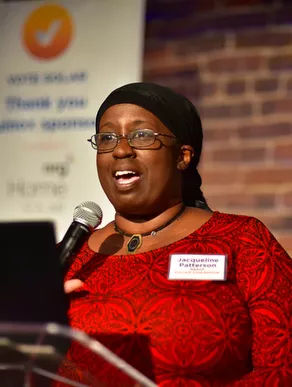NAACP Environmental and Climate Justice Director Jacqui Patterson Gives Earthweek Keynote

The Bryn Mawr Sustainability Group hosted Jacqui Patterson, the Director of the NAACP's Environmental & Climate Justice Program, in honor of Earth Week for a talk entitled “the Flint Water Crisis, Environmental Racism, & Advancing a Just and Sustainable Transition” on Tuesday, April 19.
Using a mixed media presentation that included a PowerPoint and two short video clips, Patterson sketched out the build-up and social consequences of the crisis in Flint, Michigan.
Patterson began her talk with a brief history of Flint, which is where General Motors was founded and was at one time home to its largest plant.
"We had this situation where Flint was only useful for General Motors as a host but, as it lost its usefulness, the jobs moved elsewhere,” said Patterson.
With the departure of jobs, Flint saw an economic downturn so severe that an outside financial planner had to be brought in to manage the situation. From that point onwards, said Patterson, communal decisions were taken with a view towards economics and cost-minimization rather than communal wellbeing.
“This is the system we live in, where it’s consistently profits over people,” Patterson told the audience.
For Patterson, the hiring of a financial planner was fundamentally undemocratic.
“That’s at the core of our democracy: of the people, by the people, for the people and…when you put in a financial planner who wasn’t from Flint and didn’t live in Flint…There’s a level of scrutiny and analysis that comes when you know you’ll be affected by your decisions,” she added.
In answer to the question of “Why did this happen in Flint?,” Patterson responded: “The general feeling is that it wouldn’t have happened if Flint was not majority African-American. Flint is around 52-56 percent African American.”
Speaking with Sustainability Intern and Earth Week Planner Piper Martz ’16 after the talk, she highlighted broader themes of social justice and linkages with the Bryn Mawr community.
“This is an incredible year not only for social justice (especially with the Black Lives Matter Movement) but also with environmental justice with the COP21 Paris accords and agreements being signed," said Martz. "It just seemed so appropriate to have this conversation at this point of talking about environmental justice—especially with the Flint water crisis. Bryn Mawr is a community that is incredibly conscientious about social justice issues—we have students from Flint Michigan—so it’s really special that we’re able to start this dialogue.”